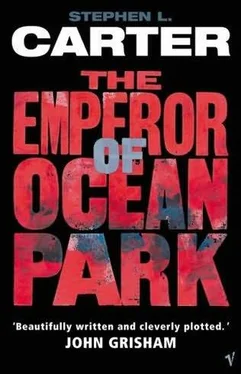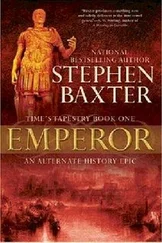Stephen Carter - Emperor of Ocean Park
Здесь есть возможность читать онлайн «Stephen Carter - Emperor of Ocean Park» весь текст электронной книги совершенно бесплатно (целиком полную версию без сокращений). В некоторых случаях можно слушать аудио, скачать через торрент в формате fb2 и присутствует краткое содержание. Жанр: Криминальный детектив, на английском языке. Описание произведения, (предисловие) а так же отзывы посетителей доступны на портале библиотеки ЛибКат.
- Название:Emperor of Ocean Park
- Автор:
- Жанр:
- Год:неизвестен
- ISBN:нет данных
- Рейтинг книги:3 / 5. Голосов: 1
-
Избранное:Добавить в избранное
- Отзывы:
-
Ваша оценка:
- 60
- 1
- 2
- 3
- 4
- 5
Emperor of Ocean Park: краткое содержание, описание и аннотация
Предлагаем к чтению аннотацию, описание, краткое содержание или предисловие (зависит от того, что написал сам автор книги «Emperor of Ocean Park»). Если вы не нашли необходимую информацию о книге — напишите в комментариях, мы постараемся отыскать её.
Emperor of Ocean Park — читать онлайн бесплатно полную книгу (весь текст) целиком
Ниже представлен текст книги, разбитый по страницам. Система сохранения места последней прочитанной страницы, позволяет с удобством читать онлайн бесплатно книгу «Emperor of Ocean Park», без необходимости каждый раз заново искать на чём Вы остановились. Поставьте закладку, и сможете в любой момент перейти на страницу, на которой закончили чтение.
Интервал:
Закладка:
Then I frown. I sense something peculiar about the set, even as it lies in the box, but I cannot quite work it out.
I glance around at Bentley, who has plucked a volume of C. S. Lewis from my father’s shelf and seated himself in my father’s recliner. The Judge used to quote Lewis by the yard. His grandson has selected a page at random and is running his stubby fingers along the lines of type, his mouth moving as though he can read the words. Well, maybe he can a little, maybe he will surprise us all, as he so often has.
I close the box and put it back on the table. I cross to the desk and settle myself in the executive swivel chair, the oxblood leather old and cracked. I am not sure what I am doing, why I am even in this room, much less why I am sitting at the Judge’s desk. On the credenza behind the desk stands a computer, complete with a printer-scanner-fax machine, nothing but the best, meaning the most expensive, for the Honorable Oliver C. Garland, as much of his mail was still addressed when he died. As usual, the computer is enveloped in a form-fitting green plastic dust cover-a dust cover!-because, although Addison, who loves computers, insisted that the Judge ought to have the latest technology and often went out and purchased it for him, my father hardly ever used it, preferring to compose his speeches and essays and angry letters to the editor, even his books, on yellow legal pads, which Mrs. Rose, his assistant, would later transcribe. Two pads sit on his desk, one of them missing the top few pages, both of them entirely blank.
No clue there, either.
I slide open a file drawer at random and find a few drafts of this and that, along with a scattering of financial records. Leafing through the next drawer, which seems to contain letters, I am startled briefly by a rapping sound behind me. Bentley has crawled into the kneehole on the far side of the desk and is knocking on the wood and giggling. I realize that I am supposed to answer, like at a door.
“Who’s there?” I say, very loud, holding in my hand some mutually flattering correspondence between the Judge and a syndicated columnist sufficiently far to the right that the Heritage Foundation probably would not have him in.
“Knock-knock,” my son says with a laugh, getting the joke backward.
“Who’s there?” I repeat.
“Bemmy. Bemmy dere.” He comes flying out, uncoiling at that remarkable speed that three-year-olds of both sexes seem able to summon at an instant, sprawling cross-legged on the vast Oriental carpet, then rolling to his feet like a paratrooper who has made a perfect landing. “Bemmy dere! Dare you!”
I step deftly around the desk to hug my son, but he shoves happily free of me and tears off toward a little sitting area my father arranged under the largest of the three windows on the long side of the room. From his parents, or at least his father, Bentley has inherited a certain reckless clumsiness. So I am not entirely surprised when, looking back to see whether I am playing, my son smashes into the Judge’s chess table. The marble board lifts, then crashes back onto the glass-topped table. Nothing breaks, but the elegant box tumbles onto its side and the hand-turned pieces patter like rain against window and walls, then drop to the floor. Bentley tumbles backward, landing on his well-padded rump with a surprised grunt.
“Bemmy hurt,” my son announces in wonderment. He sheds no tears, perhaps because he possesses, already at age three, the Garland frugality with displays of emotion. “Bemmy ouch.”
“You’re okay,” I assure him, crouching for a hug he does not seem to want. “You’re just fine, sweetheart.”
“Bemmy ouch,” he reminds me. “Bemmy fine. Bemmy okay.”
“That’s right, you’re okay.”
Bentley climbs to his feet and toddles off in the direction of my father’s desk. I stoop to pick up the scattered chess pieces, setting them not in the box but in the positions from which they would begin a game. I note with irritation that two pawns are missing, one white and one black. I glance around the carpet again but see nothing. Pieces of this size are not easy to miss. I peek under the wooden chairs on either side of the chess table: still nothing.
From out in the hallway, I hear the mischievous chatter of two or three of my sister’s children, fresh from the shower, and, as Bentley rushes out to join them, my mind sparks with unreasoning anger. Why do the pawns number only fourteen instead of sixteen? The answer is infuriatingly obvious. The missing chess pieces are evidence that Mariah’s children have been frolicking in here. My sister, as usual, sets no limits on the freedom of her spoiled little brood. True, the house will soon be hers, but she might wait more than a week before letting her kids turn the room where the Judge died into a playpen-or a pigpen.
Still, having a rambunctious child of my own, I can see why the cavernous room might qualify as an attractive nuisance. Unfortunately, a collectible chess set, like the one my father used to compose his problems, is worth a good deal less with pieces missing. I assume that the missing pieces will turn up, and I catch myself wondering whether Mariah, about to inherit the house and all its contents, might be persuaded to let me have the chess set. I could even return it to the Vineyard, where my father used to work on his compositions in the good old days, sitting alone on the porch in the evening, sipping lemonade, hunched over the board-
Downstairs, the doorbell rings, and I shiver, suddenly certain that somebody has come to the house to deliver more bad news. I am already halfway out the door when Sally’s substantial voice comes blasting up from the foyer:
“Tal, there’s some men here to see you.” A pause. “They’re from the FBI.”
CHAPTER 7
“You people work fast,” I tell the two agents as we settle in the living room. I have offered them something to drink, which they have declined. I am more nervous than I want to be, but that is because I am not quite ready to talk to them; I am not quite sure how to handle some of the questions they are sure to ask about my wife. Mariah, in dark slacks and bright red socks, stands in the arched entry to the foyer, watching us carefully. Sally, wearing one of her endless supply of too-tight dresses, peeks around the corner with wide, agitated eyes.
“Just doing our job,” says the tall one, a black man named Foreman. I wonder if he is deliberately misunderstanding me.
“What I mean is, we buried my father yesterday,” I explain. “My wife told me you would be coming by soon, but I would think that this could wait.”
The two men exchange a look. The shorter man, McDermott, has an angry white face, sandy hair, and a large, unsightly birthmark on the back of his hand. He seems old for this work, sixtyish, but I am wary of stereotypes. The taller one is calm and wears glasses. His hands are in constant motion, the hands of a magician. The two agents are seated awkwardly on the cream-colored sofa, as though worried about marring it. Both wear suits far cheaper than anything the mourners who crowded into the foyer last Friday would buy. I am across from them in a creaky rocker. Somewhere in the house, I hear shrieks of joy, and I know that five Dentons, plus one Garland, are off on another destructive rampage.
“We don’t think it can,” McDermott reports, staring me down.
“Well, I think this is inappropriate. I mean, naturally, I’ll be happy to help in any way I can. But surely it doesn’t have to be done today.”
There is an odd moment of silence. I have the slightly scary sense that they know secrets they are contemplating whether to reveal. I remind myself that this is America.
Читать дальшеИнтервал:
Закладка:
Похожие книги на «Emperor of Ocean Park»
Представляем Вашему вниманию похожие книги на «Emperor of Ocean Park» списком для выбора. Мы отобрали схожую по названию и смыслу литературу в надежде предоставить читателям больше вариантов отыскать новые, интересные, ещё непрочитанные произведения.
Обсуждение, отзывы о книге «Emperor of Ocean Park» и просто собственные мнения читателей. Оставьте ваши комментарии, напишите, что Вы думаете о произведении, его смысле или главных героях. Укажите что конкретно понравилось, а что нет, и почему Вы так считаете.












